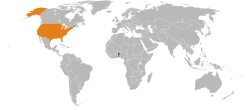
Benin, officially the Republic of Benin, and formerly Dahomey, is a country in West Africa. It is bordered by Togo to the west, Nigeria to the east, Burkina Faso to the north-west, and Niger to the north-east. The majority of its population lives on the southern coastline of the Bight of Benin, part of the Gulf of Guinea in the northernmost tropical portion of the Atlantic Ocean. The capital is Porto-Novo, and the seat of government is in Cotonou, the most populous city and economic capital. Benin covers an area of 114,763 square kilometres (44,310 sq mi) and its population in 2021 was estimated to be approximately 13 million. It is a small, tropical country. It is one of the least developed, with an economy significantly dependent on agriculture, and is an exporter of palm oil and cotton. Some employment and income arise from subsistence farming.

The African Growth and Opportunity Act, or AGOA is a piece of legislation that was approved by the U.S. Congress in May 2000. The stated purpose of this legislation is to assist the economies of sub-Saharan Africa and to improve economic relations between the United States and the region. After completing its initial 15-year period of validity, the AGOA legislation was extended on 29 June 2015 by a further 10 years, to 2025.
Haiti—an island country 600 miles off the coast of the U.S. state of Florida—shares the Caribbean island of Hispaniola with the Dominican Republic. Haiti has received billions in foreign assistance, yet persists as one of the poorest countries and has the lowest human development index in the Americas. There have been more than 15 natural disasters since 2001 including tropical storms, flooding, earthquakes and hurricanes. The international donor community classifies Haiti as a fragile state. Haiti is also considered a post-conflict state—one emerging from a recent coup d'état and civil war.

Ivory Coast is one of the most pro-United States nations in Africa and the world, with 85% viewing the U.S. favorably in 2002, and rising to a high of 88% in 2007.
The Corporate Council on Africa (CCA) is a trade association focusing on strengthening commercial relationships between the United States and the African continent.
Moussa Okanla was a Beninese scholar and diplomat. Okanla was appointed Minister of Foreign Affairs in the government named on 17 June 2007, and was replaced by Jean-Marie Ehouzou on 22 October 2008.
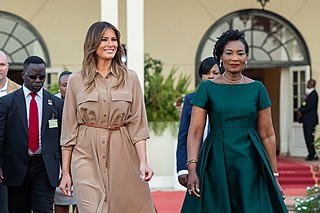
The United States established diplomatic relations with Malawi in 1964 after Malawi gained independence from the United Kingdom. Malawi's transition from a one-party state to a multi-party democracy significantly strengthened the already cordial U.S. relationship with Malawi. Significant numbers of Malawians study in the United States. The United States has an active Peace Corps program, Centers for Disease Control and Prevention, Department of Health and Human Services, and an Agency for International Development (USAID) mission in Malawi. Both countries have a common history and English language, as they were part of the British Empire.

The diplomatic relationship between the United States of America and Zambia can be characterized as warm and cooperative. Relations are based on their shared experiences as British colonies, both before, after and during the struggle for independence. Several U.S. administrations cooperated closely with Zambia's first president, Kenneth Kaunda, in hopes of facilitating solutions to the conflicts in Rhodesia (Zimbabwe), Angola, and Namibia. The United States works closely with the Zambian Government to defeat the HIV/AIDS pandemic that is ravaging Zambia, to promote economic growth and development, and to effect political reform needed to promote responsive and responsible government. The United States is also supporting the government's efforts to root out corruption. Zambia is a beneficiary of the African Growth and Opportunity Act (AGOA). The U.S. Government provides a variety of technical assistance and other support that is managed by the Department of State, U.S. Agency for International Development, Millennium Challenge Account (MCA) Threshold Program, Centers for Disease Control and Prevention, Department of Treasury, Department of Defense, and Peace Corps. The majority of U.S. assistance is provided through the President's Emergency Plan for AIDS Relief (PEPFAR), in support of the fight against HIV/AIDS.
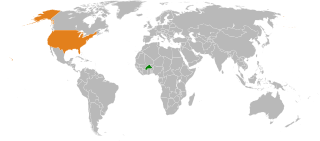
Relations between Burkina Faso and the United States are good but has been subject to strains in the past because of the Compaoré government's past involvement in arms trading and other sanctions-breaking activity.

Cameroon–United States relations are international relations between Cameroon and the United States.
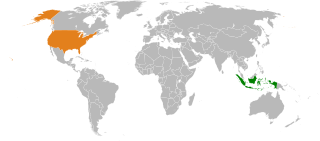
Indonesia and the United States established diplomatic relations in 1949. Relations are generally strong and close. Both are republics and recognize the strategic importance of their counterpart.

Liberia – United States relations are bilateral relations between Liberia and the United States.

The United States and North Macedonia enjoy excellent bilateral relations.

Madagascar – United States relations are bilateral relations between Madagascar and the United States.

Senegal–United States relations are bilateral relations between Senegal and the United States.
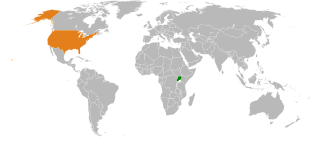
Uganda – United States relations are bilateral diplomatic, economic, social and political relations between Uganda and the United States.

The following outline is provided as an overview of and topical guide to Benin:
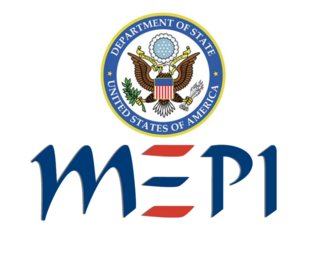
The U.S.-Middle East Partnership Initiative (MEPI) is a United States State Department program that fosters meaningful and effective partnerships between citizens, civil society, the private sector, and governments in the Middle East and North Africa (MENA) region to resolve local challenges and promote shared interests in the areas of participatory governance and economic opportunity and reform.

United States aid to Sudan has three key objectives: a definitive end to conflict, gross human rights abuses, and genocide in Darfur; implementation of the north–south Comprehensive Peace Agreement that results in a peaceful post-2011 Sudan, or an orderly path toward two separate and viable states at peace with each other; and ensuring that Sudan does not provide a safe haven for international terrorists. Sudan has experienced two civil wars since 1955, the second of which lasted 22 years. During this time, the U.S. was the largest provider of foreign aid to Sudan, largely focused on humanitarian aid through the U.S. Agency for International Development. Sudan is listed as the U.S. government's highest priority in Africa due to "its importance for counter-terrorism and regional stability, as well as the magnitude of human rights and humanitarian abuses" U.S. foreign aid to Sudan has begun to see some positive indicators of performance although critical reaction has said that aid to Sudan is neither strategic nor focused.
Gabonese Americans are Americans of Gabonese descent.
